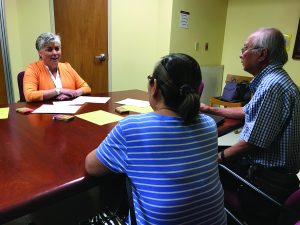As parents age, many adult children step into the role of caregiver. However, for those who live far from their parents, caregiving presents different challenges. Planning, communication and a team approach can significantly improve the process.
♦ Don’t Wait for a Crisis
Taking care of someone else is always easier if you plan ahead and address concerns as soon as possible. If you wait for a crisis — a fall, serious illness or disease diagnosis — scrambling to make arrangements can be more chaotic, emotionally overwhelming and often limits available options. Preparation is the key. Familiarity with your parent’s healthcare team, community and financial resources, and your parent’s choices can make caregiving more manageable and less stressful. Even if you have family and friends at home, working as a team with a plan based on your parent’s preferences will help.
♦ Define and Discuss Your Concerns and Theirs
The Queen’s Medical Center’s Community and Post-Acute Care Services Director Hermina Taylor, MSN, FNP-BC, APRN-RX, and licensed social worker for the Queen’s Clinically Integrated Physician Network Jamie Fukui-Chiang have worked with elderly patients for a combined total of more than 50 years. They say the first step is to define your concerns.
For example, are your parents doing fine now, but you want to get a plan in place. Or, are you already worried your mom is isolated and not eating? Are you concerned your dad might fall from mounting clutter in the home? Or, is one of your parents a caregiver for the other and getting burnt out? These and other issues are common challenges as people age and each concern can lead to different types of help.
Next would be to talk with your parents about your concerns and ask about their concerns. You may be worried about the growing clutter in their home and potential fall risks. However, your mom might be much more concerned about your dad’s growing confusion. Although it may be uncomfortable and/or they may resist, Fukui-Chiang says, “It matters what they see because that’s what they’ll work on.”
♦ Know Their Wishes
For current concerns and long-term or end-of-life issues, you need to know your parents’ wishes and their realistic options. Parents may not want to have these discussions for fear of being a burden, but Taylor suggests you let them know. “This will relieve my burden, so please share with me. I don’t want to have to make those decisions for you. I need to know what you want.”

Lori Protzman, RN, coordinator for the Queen’s Advance Care Planning Clinic, meets with adults and families to discuss healthcare planning, quality-of-life values and choices, and related documentation to ensure wishes are followed.
If, for example, you think there’s a fall risk, is your parent willing to have a free fall assessment done or wear a medical alert button? Or, if confusion or memory is an issue, are they willing to let you talk with their doctor? If they want to live independently no matter what, are there financial resources available for professional caregivers in the home? And, who do they want to give signing authority to if they can no longer sign for themselves?
The only way to know what they want is to talk with them. Dr. John Houk, a primary care physician for 38 years, says, “You can make them safe in a care home, but they may be miserable. You always want to balance keeping them safe with ensuring the quality of life they value.”
Houk discourages families from using random online resources and says a case manager can be helpful, especially in complex or complicated situations. A case manager can see what is happening in the home, such as safety or nutrition issues. Your parent’s physician may be able to identify helpful resources for you or there are reliable city, state, and national resource information online (see “Resources” below).
♦ Discuss and Document End-of-Life Wishes
End-of-life care discussions can be emotional and uncomfortable, but they are crucial for easing decision making when that time comes. Experts suggest all adults have some type of advance care planning written out, but especially after age 60.
Without knowing what your parent would want, that decision will likely be on you and having to guess can be excruciating. What would your parents want if they could no longer feed themselves or breathe on their own? You can discuss this with them and their physician, attend a presentation by a group like Kōkua Mau or meet with a program like the Queen’s Advance Care Planning Clinic. These experts can help families understand their options, make informed decisions, and discuss issues like financial resources and roles family members will take.
♦ Work as a Team
If you have a family working together, assign one person to be the physician contact. If you have siblings or other trusted relatives and friends, each person can take a certain role. Fukui-Chiang had clients with a daughter living abroad and a son on the mainland. They each took certain roles and responsibilities and had regular phone and email communication with the care team. Houk knows a family that divided tasks by shopping, organizing pills, managing finances and home repairs. The key is to find the way it can work for your family and the resources available.
Although the medical team may not be able to share information without permission, you can still tell them your concerns. Call or send a note if you are worried about certain issues. The healthcare team can provide an objective view of the issues and better identify priorities if they have all the information.
Caregivers should also understand the new trend toward team-based healthcare for many physician offices. Taylor explains, “Care is getting so complex. Navigating the system is more complex. We need multiple disciplines working collectively to provide a comprehensive plan of care. Patients and caregivers are part of the team.” So, rather than talking to the physician directly, you may talk to the medical assistant. Instead of seeing the physician for each visit, you might see the nurse practitioner. The team, including a possible care manager, works under the guidance of the primary care physician. The structure is proving more effective for providing high-quality care.
♦ Make Check-Ins Count
To ensure they’re doing OK, ask more direct questions that require detailed answers. Fukui-Chiang says to ask, “What did you eat for dinner last night?” instead of “Did you eat?” Rather than “Did you take your meds?” ask “When did you refill your meds?” Ask “Do you have money to pay your bills?” instead of “Did you pay your bills?” Houk recommends making sure parents have adequate nutrition, regular exercise and socialization.
Experts say the most important thing you can do is to be an educated caregiver.
Taylor explains, “Every person and situation is unique and there’s no one right way to do things. Know your resources.” information.
RESOURCES
- Parent’s physician/healthcare team
- National Alliance for Caregiving: www.caregiver.org
- Hawai‘i State Executive Office of Aging: www.health.hawaii.gov/eoa/
- City and County of Honolulu Elderly Affairs Division: www.elderlyaffairs.com
- Kōkua Mau: information on end-of-life care:
www.kokuamau.org/talk-about-end-of-life-care/
www.kokuamau.org/the-last-stages-of-life/

